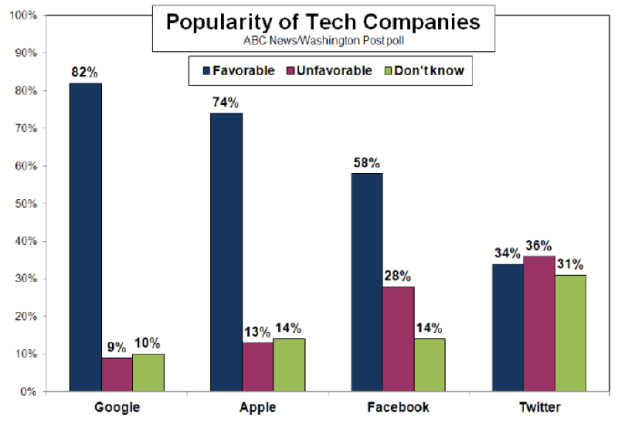
Here’s some information that should raise your eyebrows: Google is wildly more popular among the general public than Apple, Facebook, or even little ol’ Twitter, according to a recent ABC/Washington Post poll. This, despite the fact that the poll took place soon after the heated uproar over Google’s new, unified privacy policy, between March 28 and April 1.
Among those surveyed — 1,007 adults — Google enjoys a staggering 82 percent favorability rate, with 53 percent having a “strongly” favorable opinion of the Internet giant. Just 9 percent view Google unfavorably.
Apple came second in the popularity contest, with a 74 percent favorability rating, but the iPhone maker, known for its almost religiously devoted fan base, had a “strong” favorability rating of just 37 percent — 16 points lower than Google.
Facebook came in third, with a 58 percent favorability rating over all — surprisingly low, considering it is the most-used social network in the world. Twenty three percent said they “strongly” favor Facebook, while 13 percent said they have a severely unfavorable impression of the social network.
Twitter ranked lowest on the totem pole, with a mere 34 percent favorability rating — 2 points LOWER than the micro-blogging platform’s overall negative favorability rating. Only 8 percent admitted that they have a strongly positive opinion of Twitter, while 14 percent have just the opposite feelings about the service. Part of this opinion spread is due to the fact that far fewer people even knew what Twitter is, with a full 31 percent having no opinion about it whatsoever — more than twice that of any other company on the list.
Not surprisingly, all the companies polled least well among those senior citizens. And Facebook received the highest favorability rating — 76 percent — among young adults. Interestingly, Google and Apple both polled best among people who make over $100,000 a year — 93 and 91 percent favorability, respectively.
For those of us in the tech press, Google’s popularity is rather shocking. Since Google co-founder Larry Page re-took his spot as the company’s CEO, Google’s famous “Don’t be evil” motto has repeatedly been called into question, especially in light of the aforementioned privacy policy change, as well as Search Plus Your World, and other seemingly poorly-received changes.
Apparently, those suspicions are far overblown — at least if you take a single poll as a true indication of the public’s feelings on the matter. Perhaps, like so many other things in this world that are too big to fully comprehend, it will take quite a bit more time for the dust to settle.
See the full poll results below:
Editors' Recommendations
- 5 ways the Samsung Galaxy S24 beats the Google Pixel 8
- We now know when Apple is adding RCS to the iPhone
- The Google Pixel Watch 3 could steal this Apple Watch feature
- Apple is about to change iPhone web browsing forever
- Google Pixel Watch 2 vs. Apple Watch Series 9: a new king?

